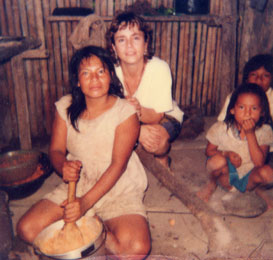 |
|

Medical Anthropology; Matsigenka; Amazon; Health-Seeking Behaviour; Well-Being; Biometrics
Carolina Izquierdo is a postdoctoral fellow at CELF. She received her Ph.D. in anthropology from UCLA in 2001. During her graduate studies, Izquierdo was the recipient of numerous research fellowships, including a Fulbright IIE fellowship and a National Science Foundation fellowship, both for her dissertation fieldwork in Peru with the Matsigenka.
Dissertation Research
My dissertation research presents an ethnographic account of illness management in a Matsigenka community in the Peruvian Amazon. I asked how health and well-being are maintained, disrupted and restored. The research compared emic and etic constructions of illness and provided a comprehensive socio-historical overview of the threats to health and well-being in the context of past and present economic development and new settlement patterns. A dynamic cultural-process approach to health seeking was used to frame the inquiry and guide methods to provide a systematic focus for the interpretation of results. The approach was dynamic in that it considered illness as an emergent and ongoing problem shaped by material and ideological conditions. Systematic research was also conducted to investigate how memory affects people’s recollections of the illness episode to ascertain how retrospective data compares with observed behavior over time. Distribution of knowledge and illness experiences, together with available resources and treatments, were discovered using interactive data gathering techniques and analysis, which included; cognitive methods (free-lists and pile-sorts etc,.) triangulation with secondary data from prior health assessments in the same community, through the use of participant observation, in-depth interviews and analysis of illness narratives. Illnesses were identified and tracked as they unfolded over a period of approximately two years.
Among other findings, the results show that whereas biometric evidence confirms that Matsigenka health has improved in the past twenty to thirty years since settlement, the Matsigenka themselves perceive their health to be deteriorating. Wide-scale economic development in the region, and dramatic social change, have engendered new forms of social distress and conflict related to competition for resources and the struggle to maintain their values and way of life. New social and health threats have emerged that are tied to anxieties about the corrupting influence of outsiders, including: environmental hazards linked to the exploitation of energy reserves, --specifically oil and natural gas—the adoption of negative health patterns like drinking, the ever-escalating forms of interpersonal conflict, and the erosion of community-based values governing work, sexuality, health, and social roles. The Matsigenka report that their health and quality of life has significantly deteriorated due to settlement and “progress.” The Matsigenka report added mental and emotional stress now. They exhibit increased fear of sorcery and suspicions associated with evil-doers, which together reflect social fears and anxieties about access to scarce resources, the nature of good and evil, and the uncertainty over future well-being. Thus, Matsigenka health is a reflection of biological, environmental, social and psychological aspects of their lives, in which culture plays an important role in shaping future expectations and evaluations of threats to well-being.
| |
